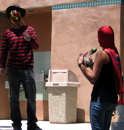 |
Here are some notes to help you work through your scene preparation meetings and stage a fun and interesting performance.
What Should We Perform?
An easy way to select the part of your scene you should perform is to multiply the number of performers in your group by 20 lines. Then find a section of a scene that is that many lines long. For example, a group of five would find a 100 line scene or take a 100 line block of a longer scene. The only rule to keep in mind is that you cannot cut up a scene and merge lines from different sections together into some kind of abbreviated scene. You must do consecutive lines from a scene.

What About Costumes?
Some kind of simple costumes are a good idea because they give you an interpretive angle on your work and allow you to make interpretations and cultural connections you will miss without them. This does not mean spending any kind of money. Simple themes and clothes that you already have can work quite well. I have included some pictures from a groups' performance of scenes of Hamlet as examples (check out the right column of the page).

Where we will perform?
By next week, I will ask you to have chosen some outdoor venue on campus for the performance of your scene: under a tree, on a patio, in a parking lot, anywhere on campus that looks fun and appropriate for your interpretation.

How will we be graded?
You will be graded individually based on your memorization of lines and your written analysis of your performance. You will not be graded on the quality of your acting. In other words, you can earn an "A'" on this project if you memorize your lines and write a thoughtful analysis of your work.

What if we need help?
I will be giving you some time in class to work on your performances and will give you some advice and counsel then. If your group meets on campus for other rehearsals, I will be happy to drop by then as well if I can. Otherwise, please use email and the phones to consult with me as often as you wish.

|












